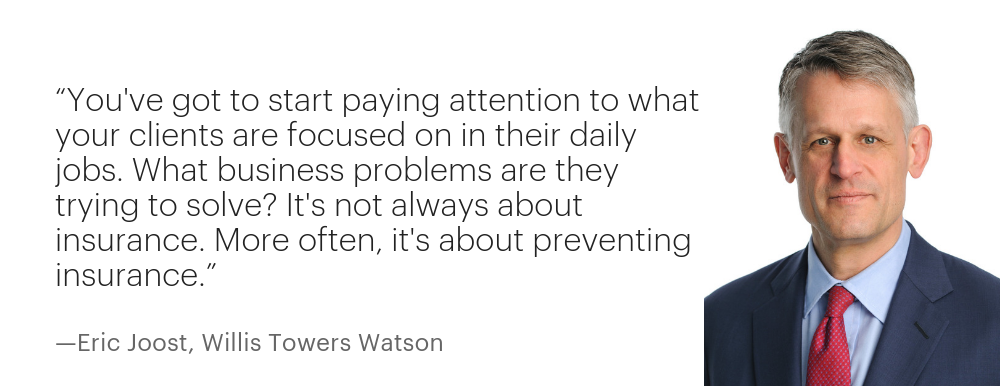Innovation in insurance, with Eric Joost (podcast)

Eric Joost of Willis Towers Watson on the importance of client experience and innovation, and the role that technology and data plays.
We’re excited to announce a new Accenture podcast. The Insurance Influencers podcast is a series of interviews with some of the industry’s most profound thinkers, in which we talk trends, technology, and the very human consequences of trends and technology. Season one of Insurance Influencers will launch in a few weeks, and in the meantime, we’re sharing clips from some of the interviews.
In this clip, Eric Joost shares his answers to the four quickfire questions we asked all our guests. Eric is the global head of property and casualty insurance at Willis Towers Watson, the third-largest insurance broker in the world.
What’s the biggest challenge facing insurers today?
From my point of view, it’s the client experience. I think insurers are caught in a very difficult transition around costs. At the end of the day, the basic product that they were very good at 20 years ago, they’re still very good at today. But they are less focused and able to deliver what I would say is advice, service and client experience. And they need to learn how to be more self-aware.
Right. And what is the biggest opportunity facing insurers today?
I think it’s in the innovation space. And I don’t think it’s necessarily dramatically new stuff. There’s this economic gap––the parts of the world that should buy insurance, that don’t buy insurance. And it’s not just consumers. It’s governments. It’s large corporations in other parts of the world.
How we deal with tangible versus intangible risk. We’re good at tangible. We’re not great at intangible. And I think there’s tons of product extensions that are just yards away from where we are today, that as people open their minds and decide to be a more innovative, they can get there.
Fantastic. What trends should be on insurers’ radars?
I think two things. One is just client focus. What are the clients focused on? And then also technology, which may not surprise anybody. Particularly in the large and complex segment, 20 or 30 years ago, the percentage of time our clients spent on the [insurance] product and the interaction with the insurer (and maybe the broker), that may have been a very large percentage of their time.
Today, for a variety of reasons, that number is very, very small––and you’ve got to start paying attention to what your clients are focused on in their daily jobs. What business problems are they trying to solve? It’s not always about insurance. More often, it’s about preventing insurance. Or it might be about balance sheet protection.
And on the technology side, I think it’s paying attention to this grand disparity between what the C-suite and the insurers are saying around technology and the reality on the ground. And there’s a lot of very well-intentioned aspiration, but the understanding of what needs to be done to change what has been embedded in the industry for decades, from a technology point of view, it’s a very, very tall challenge.
And as we move to a digital world, say in the next 10 years, we’ve got to get our minds around, “I’ve got to run a business digitally and I may have to run a mirror image of that business with humans for a while,” and that’s very, very tricky. But there’s a lot of opportunity in getting to the other side.
And piggybacking on that answer, what technology will have the greatest impact in the next 10 to 15 years?
It’s a cop-out but… Data isn’t exactly a technology, but everything is going to flow from our ability to get data and datasets right, and trusted and well-used. It’s the gateway to innovation. Today an idea without data is just an idea on the shelf, and it just can’t go anywhere if you want to bring any scale of distribution to it.
One example of a technology in this space would be the Internet of Things. But if you think about it, the IoT is just a data-intake mechanism that actually allows unique datasets to come and be used for other purposes. And it’s a wonderful technology, but the number one question I get from my interactions in Silicon Valley, particularly once you get out of the SME space, is “What’s your dataset like?” Because if I can’t have a strong dataset, I can’t use technology in the typical things that it would do.
What does it really mean? It’s how we ingest data, how we manage it, how we enrich it, how we bring third party datasets to our existing datasets and make them more valuable. How we bring quality control. All of that’s about driving trust so that we can convince others to make decisions off of it.
And then the final thing on data is governance. I think you get it a lot with some of the big social media companies, but as we do all this, and we’ve become more sophisticated, we’ve got to make sure and look at the path others have cut for us and go, “We have to make sure people can trust our ability to manage our data on their behalf,” because if we don’t do that well, somebody else will be managing it for us.
Stay tuned for the launch of Insurance Influencers, where we’ll talk with Eric about how the role of the broker has changed, why the customer experience is so important—and why diversity is both a moral and a business imperative.
What to do next:
Contact us if you’d like to be a guest on the Insurance Influencers podcast.
